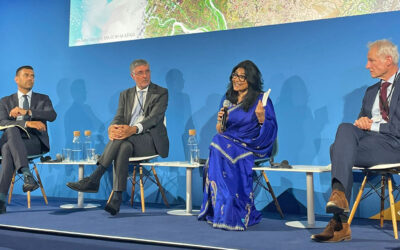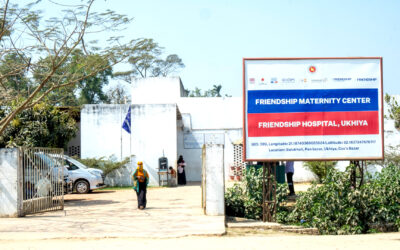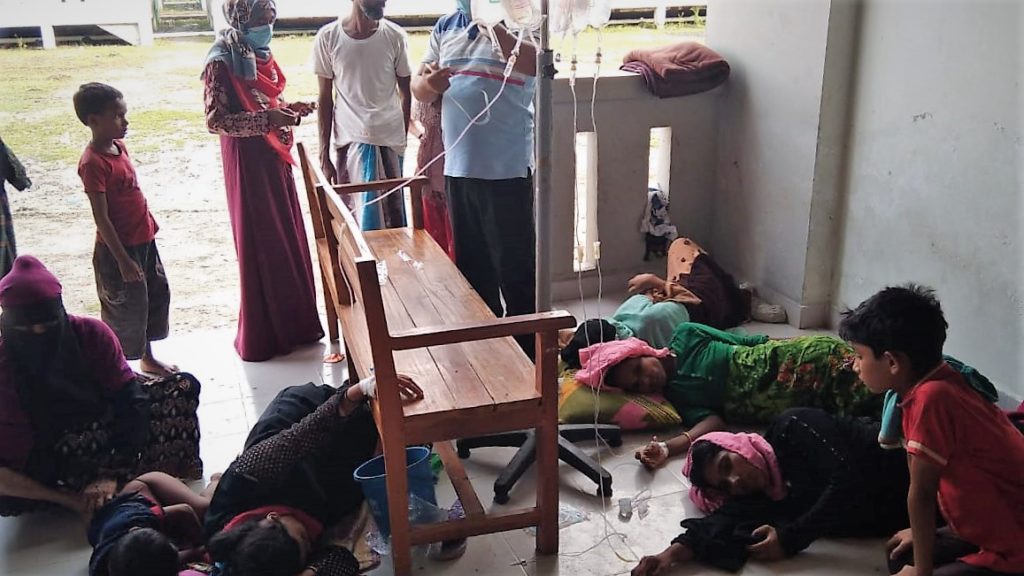
by RAEED ABD-ALLAH CHOWDHURY
Updated: June 23, 2021
Four people have died in an outbreak of diarrhoea in Bhasan Char—an island where 19,000 Forcibly Displaced Myanmar Nationals relocated since December. At least 1,837 residents—mostly women and children—became sick after a heatwave was followed by heavy rainfall in the past few weeks. A lack of clean water sources, sanitation facilities and awareness about health and hygiene practices, exacerbated the situation, according to a report by Friendship health teams who rushed to respond.
The Bangladesh government has been relocating refugees voluntarily to Bhasan Char to decongest and better manage the camps in Ukhiya and Teknaf in Cox’s Bazar which host over a million Rohingya people fleeing persecution in adjacent Myanmar.
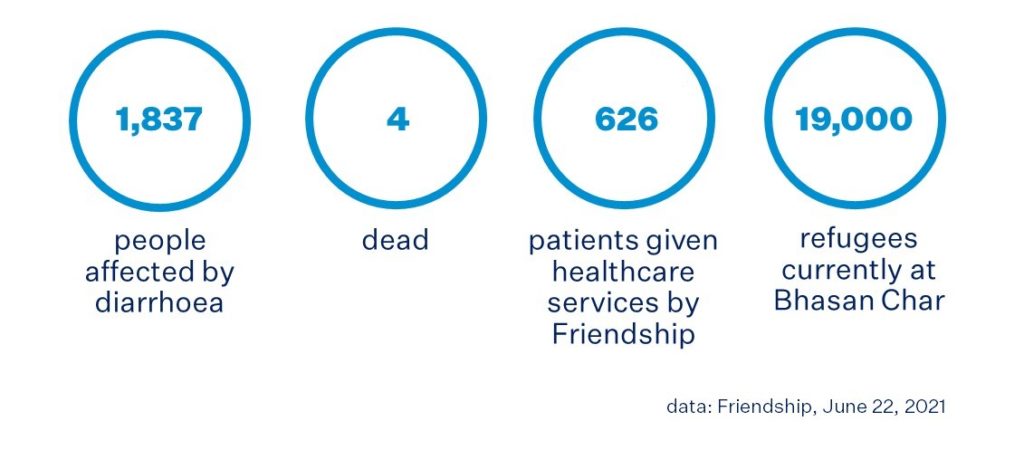
However, there remains an acute lack of awareness amongst the Rohingya community about the facilities in the new location, said Dr. Rafi A H Siddique, team leader, Friendship Health.
“Few NGOs, government or multinational agencies have comprehensive interventions as of yet,” he said, “both in terms of installations and communication and information regarding their location and use. Consequently, there is a distinct lack of awareness about not just health and hygiene practices, but also the available water sources, latrines, washing stations etc., which are also themselves quite limited in number thus far.”
The matter is made all the worse because the Rohingya community has also not been made aware of how to make saline or rehydrate themselves in episodes of diarrhoea or use water purification tablets, leading to an accelerated decline in the condition of patients. In addition, the hygiene supplies that were distributed for free by various humanitarian organisations as part of relief packages in Ukhiya are much more limited in number at Bhasan Char. Mothers are also not aware of the steps that need to be taken in case their children are affected by the infection.
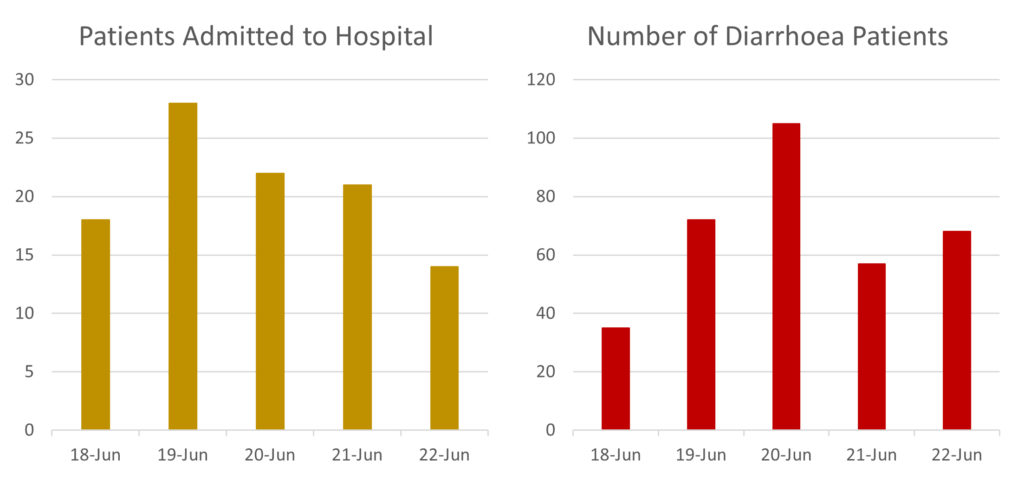
As of last Saturday, an average of 40 to 50 patients were being admitted each day to the 20-bed government hospital—the only hospital on the island. Over half the patients were lying on the floor, said the health team’s report. The hospital was also short of medication. The condition has since improved, with the average admissions each day having peaked and subsequently dropped to 21. Currently, the indoor patient unit is reserved for diarrhoea patients only.
Taking patients needing more advanced care to the district hospital in Noakhali is difficult due to the temperamental monsoon weather, which makes movement out of the island difficult, and also due to the fact that the Rohingya community members are often unable to afford the hospital fees, because of an absence of income sources.
Coordination and leadership
A laboratory investigation team from the Institute of Epidemiology, Disease Control and Research (IEDCR) arrived in Bhasan Char on June 19. They conducted Rapid Diarrhoea Tests on 29 samples at the 20-bed hospital until yesterday, out of which 14 were found positive for V. Cholera (Vibrio Cholerae). The team will send the samples to Dhaka for a confirmatory test.
On June 21, a meeting was conducted between the Refugee Relief and Repatriation Commissioner (RRRC), government, navy, IEDCR, Bangladesh Red Crescent Society and the NGOs who provide healthcare services in Bhasan Char to identify the gaps in the humanitarian response. It was decided that all the sectors must work together to address the crisis. A guideline for NGOs was also shared.
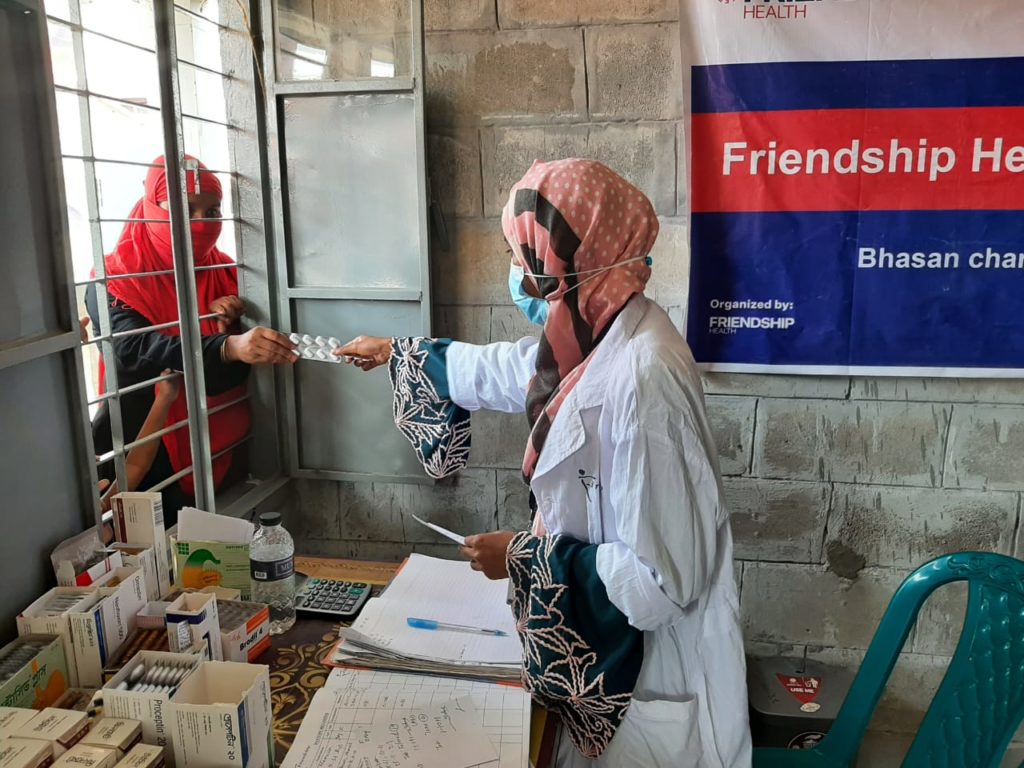
Initiatives taken by Friendship
Friendship has deployed its health service providers to the 20-bed government hospital for providing necessary support to manage the inflow of patients. Oral saline, infants’ zinc supplements and other medication has also been provided to the Government as well as the office of the Refugee Relief and Repatriation Commissioner. Oral saline and Baby Zinc tablets were also distributed directly to Rohingya families of the affected clusters.
Friendship has deployed a team to raise awareness among the Rohingya community on health and hygiene by household visits. The team set up a handwashing station station to teach residents techniques to properly was their hands using soap. The station had instructed 298 people as of yesterday. At least 260 patients were also instructed on making saline using salt and sugar, or rice saline.
As of Friday, June 18, 2021, Friendship delivered healthcare services to 626 patients suffering from diarrhoea at the Bhasan Char. The outbreak appears to have peaked on June 20, with some medication and saline now coming in, as well as tube wells and latrines being set up. However, a coordinated effort in tackling the outbreak between multiple partner organisations, NGOs and government agencies is still required, with oversight by a multilateral organisation such as the World Health Organization, said Rafi. “This is currently the practice at the camps in Ukhiya, but has not been replicated at Bhasan Char yet.”


